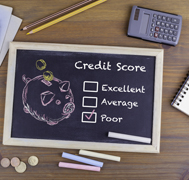By the Numbers: What is a Bad Credit Score?
 Your credit score is very important. It represents how lenders perceive you as far as risk and impacts how likely you are to obtain various credit products. If you’re concerned about your credit, you may be wondering what a bad credit score is – and so today’s blog should help you better evaluate your own situation.
Your credit score is very important. It represents how lenders perceive you as far as risk and impacts how likely you are to obtain various credit products. If you’re concerned about your credit, you may be wondering what a bad credit score is – and so today’s blog should help you better evaluate your own situation.
A consumer credit score, also known as a FICO score or Beacon score, ranges from 300 to 900. According to TransUnion, a score above 650 will likely qualify you for a standard loan while a score under 650 will typically make receiving new credit difficult. These are the typical ranges:
- 750+ Excellent
- 680+ Good
- 600-680 Fair
- Below 600 is not good
One of the quickest ways to get a bad credit score is to default on your current debts. Missing even one payment can be detrimental. Also, if you have defaulted on numerous accounts, you may not actually remember everything you’ve missed (phone bills, utilities, and other products that are not loans and credit cards), meaning they often get lost in the shuffle, further impacting your credit score.
Building great credit takes work, but breaking down that great credit can be swift and long-lasting. Once credit has been destroyed, you may want to throw your hands up in the air in defeat, but don’t give up –recovering from bad credit is not as painful as you might think.
If you’re ready to rebuild, there are certain steps that you can take to get the process started. Begin by getting your credit report to better understand what’s listed there and what you owe. Get it from both credit reporting agencies – Equifax and TransUnion.
The next step, and arguably the most important step, is to deal with past debt. Obviously, if you had the money to pay these past due balances, you would have done so, but ignoring them further just exacerbates the issue. Speak to a financial consultant who specializes in this area to get support concerning options to clear bad debts.
While dealing with a bad credit score and rebuilding credit, a secured credit card is a great way to build things up.
Also, remember not to repeat past bad habits. As you rebuild credit, don’t max out new credit, make late payments or go crazy applying for credit everywhere. These are all red flags for lenders and work towards bringing that credit score back down. Try to keep your limits at 50% of your available credit (or less) and make more than the minimum monthly payments.
At DebtCare, we understand how difficult it can be when you’re sitting with a bad credit score. If you’re struggling to deal with your debt, we can help.
Call us today for a free consultation: 1 (888) 890-0888.


